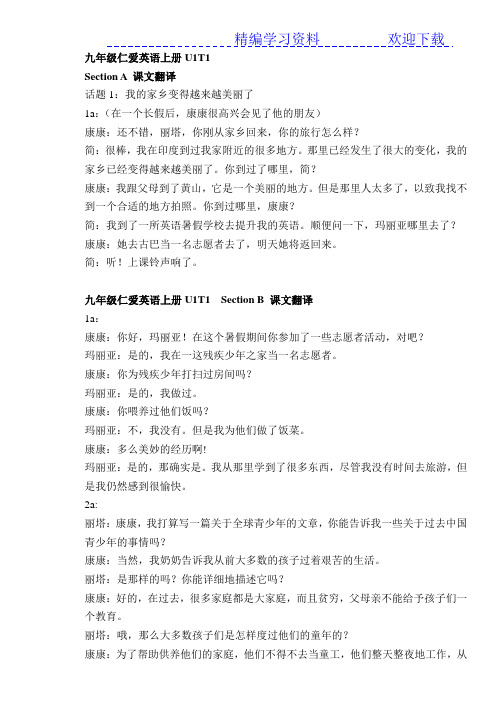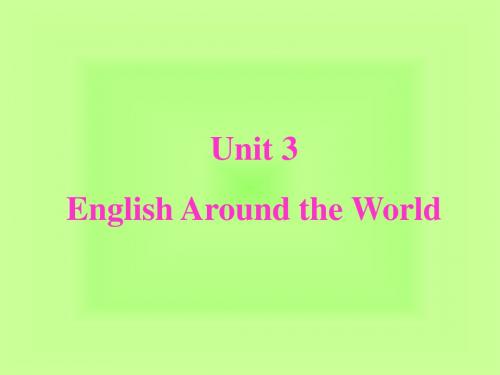仁爱英语 九年级上册Unit 3 Topic 2 课文翻译
仁爱英语九年级上册课文互译Unit1-

九年级仁爱英语上册U1T1Section A 课文翻译话题1:我的家乡变得越来越美丽了1a:(在一个长假后,康康很高兴会见了他的朋友)康康:还不错,丽塔,你刚从家乡回来,你的旅行怎么样?简:很棒,我在印度到过我家附近的很多地方。
那里已经发生了很大的变化,我的家乡已经变得越来越美丽了。
你到过了哪里,简?康康:我跟父母到了黄山,它是一个美丽的地方。
但是那里人太多了,以致我找不到一个合适的地方拍照。
你到过哪里,康康?简:我到了一所英语暑假学校去提升我的英语。
顺便问一下,玛丽亚哪里去了?康康:她去古巴当一名志愿者去了,明天她将返回来。
简:听!上课铃声响了。
九年级仁爱英语上册U1T1 Section B 课文翻译1a:康康:你好,玛丽亚!在这个暑假期间你参加了一些志愿者活动,对吧?玛丽亚:是的,我在一这残疾少年之家当一名志愿者。
康康:你为残疾少年打扫过房间吗?玛丽亚:是的,我做过。
康康:你喂养过他们饭吗?玛丽亚:不,我没有。
但是我为他们做了饭菜。
康康:多么美妙的经历啊!玛丽亚:是的,那确实是。
我从那里学到了很多东西,尽管我没有时间去旅游,但是我仍然感到很愉快。
2a:丽塔:康康,我打算写一篇关于全球青少年的文章,你能告诉我一些关于过去中国青少年的事情吗?康康:当然,我奶奶告诉我从前大多数的孩子过着艰苦的生活。
丽塔:是那样的吗?你能详细地描述它吗?康康:好的,在过去,很多家庭都是大家庭,而且贫穷,父母亲不能给予孩子们一个教育。
丽塔:哦,那么大多数孩子们是怎样度过他们的童年的?康康:为了帮助供养他们的家庭,他们不得不去当童工,他们整天整夜地工作,从来没有饱食过。
丽塔:如今青少年怎么样呢?康康:现在我们的国家迅速地发展了,政府给贫困家庭以支持,所以孩子们能够得到良好的教育。
丽塔:哦,他们是幸运的。
九年级仁爱英语上册U1T1 Section C课文翻译1a :我的关于北京的报告大家好!我是康康。
我的奶奶生活在北京40多年了,她亲自见证了北京的变化。
【公开课课件】仁爱英语九年级上册Unit 3 Topic 2 Section C

Read 1a and Finish 1C
14
Plant and In Chinese animal culture
In western culture
dog
negative meanings strong and magical creatures stands for love, peace, courage and friendship
9
Reading skill training.
Read Para.3 and choose the correct answers.
1. In China, many parents want their children to become A . “dragons”. The “dragons” here means ____
6
Reading skill training.
Read Para.2 ~ Para.4 quickly and get the main idea of each paragraph. different meanings in Para.2 Dogs have ________
China and western countries.
A. successful people B. children C. strong people D. creatures
2. In western countries, heroes killed dragons to protect people. D . This shows dragons are considered to be ____ A. brave B. strong C. lovely D. dangerous
仁爱英语 九年级上册Unit 3 Topic 3 课文翻译

Unit 3 Topic 3 课文翻译Section ALi Ming:How nice to see you back,Junfeng! How was your trip?李明:看到你回来真好啊,俊峰!你的旅行怎么样?Wang Junfeng:Wonderful! I've been to many places of interest,and I enjoyed myself in Disneyland.王俊峰:棒极了!我去了很多著名的景点,而且在迪士尼乐园玩的很开心。
Li Hong:Could you make yourself understood in the U.S.A?李红:你在美国能跟别人交流吗?Wang Junfeng:Not really. Sometimes I got into trouble. They spoke too quickly for me and there were many different accents. I couldn't have long conversations with the people there. I think I should work harder at English.王俊峰:不太能。
有时候我会遇到麻烦。
对我而言,他们说话速度太快,而且有很多种不同的口音。
我无法跟他们进行长对话。
我觉得我应该更加努力地学英语。
Li Ming:Yes,I agree. I know oral English is very important,but I dare not speak English in public. And I always feel sleepy in English classes. I'm really afraid of the final exam.李明:嗯,我赞成。
我知道口语特别重要,可是我不敢在别人面前说英语。
仁爱版英语九年级上册Unit3Topic2

Unit 3 Topic 2Section AI.根据句意,用括号内所给的提示完成句子。
1.—Excuse me, could you tell me the way to the station?—Sorry, I am a['streid?? here.2.—比论彳^时)you need help, just call me.— It is very kind of you.3.If you want to travel around Beijing, a 旅游指南)may be helpful foryou.4.Tom and his brother are flying to Japan tomorrow. Lets them _____________________________________ 迭行)at the airport.5.—Excuse me, could you please me(让........................................... 搭车)to thebus station?—Certainly. Get on, please.II.语法专练:用所给动词的适当形式填空。
1.I(fly) to Hainan tomorrow.2.You'd better(not talk) so loudly in class.3.He reads books instead of(chat) on line on Sundays.4.I have a good chance(visit) Shanghai this summer holiday.5.He had some trouble(plan) a birthday party. So he turned to his friend.6.I am thirsty. I feel like(drink) some juice.Unit 3 Topic 2Section B1.选择题:从A、B、C、D四个选项中,选出最佳答案。
仁爱英语 九年级上册Unit 3 Topic 1 课文翻译

Unit 3 Topic 1 课文翻译SectionA-1aKangkang:Hi, boys, come and have a look! I have a poster of Mickey Mouse and Donald Duck.康康:嗨,男孩们,快过来看!我有一张米老鼠和唐老鸭的海报。
Li Xiang:Oh, it's so nice! You can stick it on the wall.李想:哦,真好看!你可以把它贴在墙上。
Wang Junfeng:That's a good idea. Guess what! My parents and I are going to visit Disneyland near Los Angeles. I will be able to see more cartoon characters.王俊峰:好主意。
你们猜!我爸妈和我要去洛杉矶附近的迪士尼乐园玩。
我会看到更多卡通人物。
Kangkang:Oh, you're so lucky! Disneyland is enjoyed by millions of people from all over the world. I hope I can go there one day.康康:哦,你真幸运!全世界很多人都喜欢迪士尼乐园。
我希望有一天能去那里。
Li Xiang:Me, too. Are you ready for your trip?李想:我也是。
你准备好去旅行了吗?Wang Junfeng:Yes, of course. I can't wait to fly there!王俊峰:嗯,当然。
我迫不及待想飞到那儿去!Kangkang:You'll have a good chance to practice English there.康康:在那儿你有很好的机会去练习英语。
仁爱版九年级英语上册课件Unit 3 Topic 2 Section B 1

she never gives up.
A. If
B. Because
C. Even if D. As if
( B )3. ---I’m going to have an exam
tomorrow. ---____________.
A. Calm down B. Good luck C. You’re kidding D. I’m puzzled
……的标志
stamp one’s foot
What does the body language show ?
It shows one’s anger.
It is a typical sign of showing one’s anger.
adj.典型的,有代 表性的
Use your body language to help
news. I ___________ America tomorrow.
--- Wow, have a good trip!
A. am leaving for
B. leaves for
C. have left for
D. left for
( C )2. _____she has failed for several times,
hold hands
When do we usually hold hands with others?
仁爱英语 九年级上册Unit 2 Topic 2 课文翻译
仁爱英语九年级上册Unit 2 Topic 2 课文翻译Yes, We shouldn’t leave rubbish here and there. Don’t spit anywhere in public. Don’t walk on grass or pick flowers. Everyone should care for wild animals and plant more trees.我们不应该到处丢弃垃圾。
不要在公共场合随地吐痰。
不要践踏草坪或采摘花朵。
每个人都应当保护野生动物并且多种一些树木。
That’s r ight. We should do everything we can to protect the environment. 对。
我们应尽一切努力保护环境。
Section CThe earth is 4.6 billion years old. We humans have lived on the earth for only 35 000 years, but during this period, we have changed our planet a lot in many ways. Some things we have done are very good for the earth while others are bad.All over the world, people have cut down millions of trees. When it rains or when the wind blows, the earth is taken away. Forests have become deserts, so many kinds of animals and plants are disappearing.In big cities, cars and buses have polluted the air. Now many people in cities have health problems.Factories have also polluted the land and the water. As a result, many rivers and lakes are now dead.Around the earth, there’s a special kind of oxygen called “ozone”(O3). It is important to the earth. But now air pollution is destroying it and making a very big hole in the ozone layer. Too much harmful radiation from the sun passes through the hole and reaches the earth directly. This is very dangerous because this kind of radiation can cause cancer.Carbon dioxide (CO2) in the air has increased a lot. It mainly comes from burning oil, coal and wood. This has formed a “blanket” around the earth. The heat from the sun can’t escape so the temperatur e is rising. This is called “the greenhouse effect”. It causes the level of the oceans to rise and the climate of the earth to change.All these problems are very serious, so we must do something now.地球已有46亿年了。
仁爱版英语九年级上册Unit 3 Topic 2. 《Some things usually hav
仁爱版英语九年级上册Unit 3 Topic 2. 《Some things usually have differentmeanings in different cultures》教学设计一. 教材分析仁爱版英语九年级上册Unit 3 Topic 2《Some things usually have different meanings in different cultures》主要讨论了在不同文化背景下,某些事物可能具有不同的含义。
本节课主要通过一些具体的例子,让学生了解并认识到文化差异的存在,并学会如何理解和尊重不同文化的习惯和观念。
教材内容丰富,贴近学生生活,有利于激发学生的学习兴趣,提高学生的跨文化交际能力。
二. 学情分析九年级的学生已经具备了一定的英语基础,能够进行简单的听、说、读、写操作。
但学生在跨文化交际方面的意识和能力还有待提高。
因此,在教学过程中,教师需要关注学生的个体差异,充分调动学生的积极性,引导他们主动参与课堂活动,提高他们的跨文化交际能力。
三. 教学目标1.知识目标:学生能够掌握本课的生词和短语,理解课文内容,了解不同文化背景下事物的不同含义。
2.能力目标:学生能够运用所学知识进行简单的跨文化交际,提高自己的跨文化意识。
3.情感目标:学生能够尊重不同文化,树立全球观念,增强民族自豪感。
四. 教学重难点1.重点:学生能够掌握本课的生词和短语,理解课文内容,了解不同文化背景下事物的不同含义。
2.难点:学生能够运用所学知识进行复杂的跨文化交际,提高自己的跨文化意识。
五. 教学方法1.情境教学法:通过设定各种真实的生活情境,让学生在实际操作中学会跨文化交际。
2.任务型教学法:教师设计各种任务,引导学生主动参与课堂活动,提高他们的跨文化交际能力。
3.合作学习法:鼓励学生分组讨论,共同完成任务,培养学生的团队协作能力。
六. 教学准备1.教学课件:制作课件,展示课文内容、生词和短语。
仁爱英语九年级上册Unit1-Unit2课文翻译之欧阳语创编
仁爱英语九年级上册Unit 1-Unit 2课文翻译Unit 1 The changing world 变化中的世界Topic 1 Our country has developed rapidly我国发展迅速Section A1a:(After a long holiday, Kangkang is happy欧阳语创编to see his friends.)(长假过后,康康很高兴会见到他的朋友们。
)Hi, Jane! Did you have a good summer holiday?你好,简,你暑假过得愉快吗?Yes. What about you?是的,你呢?Not bad. Rita, you have just come back from your hometown. How was your trip?不错。
丽塔,你刚从家乡回来,你的旅行怎么样?Great! I went to many欧阳语创编places near my home in India. Great changes have taken place there and my hometown has become more and more beautiful. Where have you been, Jane? 好极了!在印度,我去了我家附近的很多地方。
那里发生了很大的变化,而且我的家乡变得越来越美丽了。
简,你去哪里了?I have been to Mount Huang with my parents. It's a beautiful place. But there were so many people that I欧阳语创编couldn't find a good place to take photos. And where have you been, Kangkang ? 我和我的父母去过黄山,那是一个美丽的地方。
仁爱版英语九年级上册unit3topic2microsoftword文档
金戈铁骑 初中英语学习材料 madeofjingetieji Unit3 Topic2 词汇课文基础过关测试 姓名: ________________学号 __________ 得分 :__________ 一、英汉互译(单词)(20× 1)
二、英汉互译(短语)(20× 1) 三、根据要求填空。(30× 1) 四、
1 flight 2 诚实的,坦率的 3 negative 4 勇气,胆略 5 magical 6 研究,调查 7 wisdom 8 错误,失误 9 expression 10 陌生人 11 totally 12 古代的,古老的 13 puzzled 14 胜利 15 positive 16 骄傲,自豪 17 underline 18 发音 19 elevator 20 无论何时
1 做关于...的调查 2 at times 3 为.......感到骄傲 4 make mistakes 5 把......比作... 6 worry about 7 把......相比 8 on one’s way to 9 为某人送行 10 a homeless day 11 上车 12 pay attention to 13 搭乘,打车 14 be regarded as 15 让某人搭便车 16 take pride in 17 伸出 18 have a victory 19 是......还是...... 20 consider......as/ to be
单词 词性 中文意思 词性 单词 中文意思 1 Britain n adj 金戈铁骑
五、根据课文内容填空。(20× 1) 1. Some things usually have ________________ ________________ in different cultures. 2. You are a lucky dog ________________ you are a lucky person. 3. The ancient emperors ________________themselves ________________ dragons. 4. The rose also ________________ ________________ peace, ________________ and friendship. 5. We bow when we saying hello ________________ ________________ ________________ ________________ respect. 6. ________________ ________________ is your flight? ——At 5 O’clock. 7. Some things have ________________ meanings in C ________________ culture and W ________________ cultures. 8. I wonder ________________ b ________________ l ________________ means the same thing in all cultures. 六、翻译句子。(10× 2) 1. 打扰一下,能带我去机场吗? _______________________________________________________________________ 2. 我叔叔明天来接我们。 _______________________________________________________________________ 3. 怎么了? _______________________________________________________________________ 4. 下个星期天我要去伦敦。 _______________________________________________________________________ 5. 不用担心。 _______________________________________________________________________ 6. 是个秘密。 _______________________________________________________________________ 7. 狗拿耗子多管闲事。 _______________________________________________________________________ 8. 我们挥手代表和平和友谊。
- 1、下载文档前请自行甄别文档内容的完整性,平台不提供额外的编辑、内容补充、找答案等附加服务。
- 2、"仅部分预览"的文档,不可在线预览部分如存在完整性等问题,可反馈申请退款(可完整预览的文档不适用该条件!)。
- 3、如文档侵犯您的权益,请联系客服反馈,我们会尽快为您处理(人工客服工作时间:9:00-18:30)。
Unit 3 Topic 2 课文翻译S ectionA-1a(Wang Junfeng and his parents are going to the USA. Michael and Kangkang are going to see them off. Now they are on their way to the airport.)(王俊峰和他的父母要去美国。
迈克尔和康康去给他们送行。
现在他们在去机场的路上。
)Wang Junfeng:I can't believe that I'm flying to Disneyland. I'm so excited.王俊峰:真不敢相信我就要飞往迪士尼了。
我太激动了。
Kangkang:Of course you are.康康:当然了。
(Michael sees a stranger putting out hand with his thumb raised.)(迈克尔看到一个陌生人拇指向上伸着手。
)Michael:Stop, please!迈克尔:麻烦停一下车!Driver:What's up?司机:怎么了?Michael:The stranger is asking for a ride. Look at his gesture!迈克尔:这个陌生人想让我们载他一程。
看他的动作。
(The driver stops the minibus.)(司机停下了面包车。
)Foreigner:Excuse me, could you please give me a ride to the airport?外国人:打扰了,你们能带我去机场吗?Driver:Sure. We're going to the same place. Get on, please.司机:可以。
我们也要去机场。
上车吧。
Foreigner:Thank you very much.外国人:非常感谢。
(They reach the airport twenty minutes later.)(二十分钟以后他们到了机场。
)Kangkang:What time is your flight?康康:你的飞机是什么时候?Wang Junfeng:At 5 o'clock. My uncle is meeting us tomorrow. But I'll still worried about my English.王俊峰:五点。
我叔叔,明天来接我。
但我还是很担心我的英语。
Kangkang:No need to worry. You can buy the guidebook, A Tour in the USA.康康:不用担心。
你可以买一本旅游指南,《美国之行》。
Wang Junfeng:Good idea. I hope I won't have much difficulty in communication.王俊峰:好主意。
希望我的交流不会有太大困难。
Michael:Whenever you need help, send me an e-mail or call me.迈克尔:需要帮助的时候,就给我发邮件或者打电话。
Wang Junfeng:Thank you very much. I have to go now. Bye!王俊峰:谢谢你们。
我得走了。
拜!SectionB-1a(Jane meets Kangkang and Y ukio at the school gate.)(简在学校门口遇到了康康和由纪夫。
)Jane:Hi, Kangkang and Y ukio!简:嗨,康康,由纪夫!Yukio:Hello, Jane!由纪夫:你好,简!Kangkang:Yukio, when Jane says "Hi" she waves her hand, but when you say "Hello" you bow.康康:由纪夫,简说“嗨”的时候,她招了手,你说“你好”的时候,你是鞠的躬。
Yukio:In Japan, we bow when we are saying hello as a sign of respect.由纪夫:在日本,我们打招呼的时候会鞠躬,来表示对对方的尊敬。
Jane:In Canada, we wave as a sign of peace and feiendship.简:在加拿大,我们招手来表示和平和友谊。
Kangkang:I think that is known as body language. We use body language to communicate how we feel, even if there is silence.康康:我觉得那就是肢体语言。
即便安静的时候,我们也会用肢体语言来交流我们的感受。
Yukio:Did you notice that Miss Wang smiles when she is happy, and when she is angry she put her hands on her hips? Then I know whether she will praise or punish us.由纪夫:你有没有注意到方老师高兴的时候就会笑,生气的时候就会把手放在身体两侧?那样我就会知道她是要表扬还是要惩罚我们。
Jane:When my little sister is angry, she crosses her arms and stamps her foot!简:我妹妹生气的时候就会双臂交叉跺着脚。
Kangkang:I wonder if body language means the same thing in all cultures.康康:我想知道肢体语言在所有文化中是不是同一个意思。
Jane:We should do some research. People could communicate better if they knew more about their body language.简:我们应该调查一下。
如果人们更加了解肢体语言,就能更好的沟通了。
Yukio:Let's ask Miss Wang and Ms. Jones if they will help us with our research.由纪夫:我们问问方老师和琼斯老师,看她们会不会帮我们做调查。
Jane:That is a good idea. Goodbye, Kangkang. Goodbye, Yukio.简:好主意。
再见,康康。
再见,由纪夫。
Kangkang and Yukio:Goodbye, Jane.康康和由纪夫:再见,简。
SectionC-1aSome things usually have different meanings in differens cultures.有些东西在不同文化中有不同的含义。
Here are some words about animals that are used differently in western cultures and Chinese culture.这里有一些关于动物的词语,在中国文化和西方文化中用法不同。
Most phrases in Chinese about the dog, such as "a homeless dog", "a mad dog","a running dog" and "a dog catching a mouse", have negative meanings.中国多数关于狗的短语,比如“丧家之犬”、“一条疯狗”、“走狗”和“狗逮耗子”,都是贬义词。
But in western countries, dogs are considered honest and good friends of humans.但是在西方文化中,狗是人类忠实的好朋友。
The word, "dog", has positive meanings.“dog”这个单词有积极地含义。
For example, "you are a lucky dog" means you are a lucky person.比如,“you are a lucky dog”的意思是你是一个幸运儿。
And "every dog has its day" means each person has good luck at times.“every dog has its day”的意思是每个人都有得意的时候。
As we know, dragons are very important in Chinese culture.我们知道,龙在中国文化中很重要。
In ancient times, dragons were regarded as strong and magical creatures.古代,人们认为龙是具有魔法的强大生物。
They brought hope and good luck.它们能带来希望和好运。
The ancient emperors compared themselves to dragons.古代皇帝把自己比作龙。
Nowadays, many parents want their children to become"dragons".现在,很多父母都望子成“龙”。
But in western cultures, dragons were dangerous animals.但是在西方文化中,龙是很危险的动物。
Heroes killed them to protect people.英雄屠龙为了保护人们。
与当今“教师”一称最接近的“老师”概念,最早也要追溯至宋元时期。
金代元好问《示侄孙伯安》诗云:“伯安入小学,颖悟非凡貌,属句有夙性,说字惊老师。
”于是看,宋元时期小学教师被称为“老师”有案可稽。
清代称主考官也为“老师”,而一般学堂里的先生则称为“教师”或“教习”。
可见,“教师”一说是比较晚的事了。
如今体会,“教师”的含义比之“老师”一说,具有资历和学识程度上较低一些的差别。
辛亥革命后,教师与其他官员一样依法令任命,故又称“教师”为“教员”。
